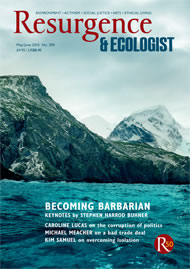With this issue, we begin a countdown to our 50th anniversary celebrations next year. It was in May 1966 that the first issue of Resurgence appeared. Principal concerns for its writers then were the Cold War, with its spectre of nuclear annihilation, the Vietnam War and other conflicts. But, as our founding editor John Papworth wrote in a Statement of Intent, Resurgence was not simply “another peace publication”, but an attempt to bring together the much more diverse concerns of a new generation.
Almost half a century on, it is fascinating to look back at early copies of Resurgence, their sparsely illustrated pages of closely set type resounding with opinions, reportage and ideas, often written in a style that today seems overly earnest. But what strikes me is how often the magazine got it right – focusing on issues and ideas that have become central to our concerns today: threats to our environment; the rights of individuals and small communities in the face of over-powerful states and corporations; questions of social justice; the need for a holistic, more spiritual understanding of our place in the universe. And just as now, the early Resurgence was concerned with literature and the other arts, ways of seeing the world in all its beauty.
This is one reason that, during the coming months, we will be republishing some articles from our early issues: a celebration of some of the fine writers and thinkers who have contributed to Resurgence (and since we merged three years ago, to Resurgence & Ecologist). We begin with an article by Leopold Kohr calling for a “new radicalism”. But it isn’t just a case of dusting off the archives: it is an evocation of the continuing spirit of Resurgence. For in this issue, that spirit is alive and well.
A genuinely radical Green politician, Caroline Lucas lists the ways in which democracy is corrupted by corporate influence. A radical environmentalist, Vandana Shiva shows how to move from waging war on Nature towards new paradigms of health and wealth in our agriculture. Charles Eisenstein tells the story of a young woman’s radicalism in her choice of life. In his Keynotes essay, Stephen Harrod Buhner, even more radically, challenges the very concept of civilisation itself. And in his own column, our editor-in-chief Satish Kumar – who has been keen to feature Stephen’s writing since hearing him speak – writes about the power of radical love.
Elsewhere, that radicalism is also to be found in our arts pages – from the Romantic and radical Samuel Taylor Coleridge, first subject in a new series on eco-poetry, to the film-maker Sarah Wood’s examination of how we watch Nature and are ourselves watched. And our reviews pages – led this month by a brace of new and stimulating books examining how we engage with Nature – themselves open up many new worlds of radical thinking.
So there’s plenty to celebrate, whether it’s looking back over our past issues or forward to the future, with all its challenges and possibilities. We hope you will enjoy the journey with us.








